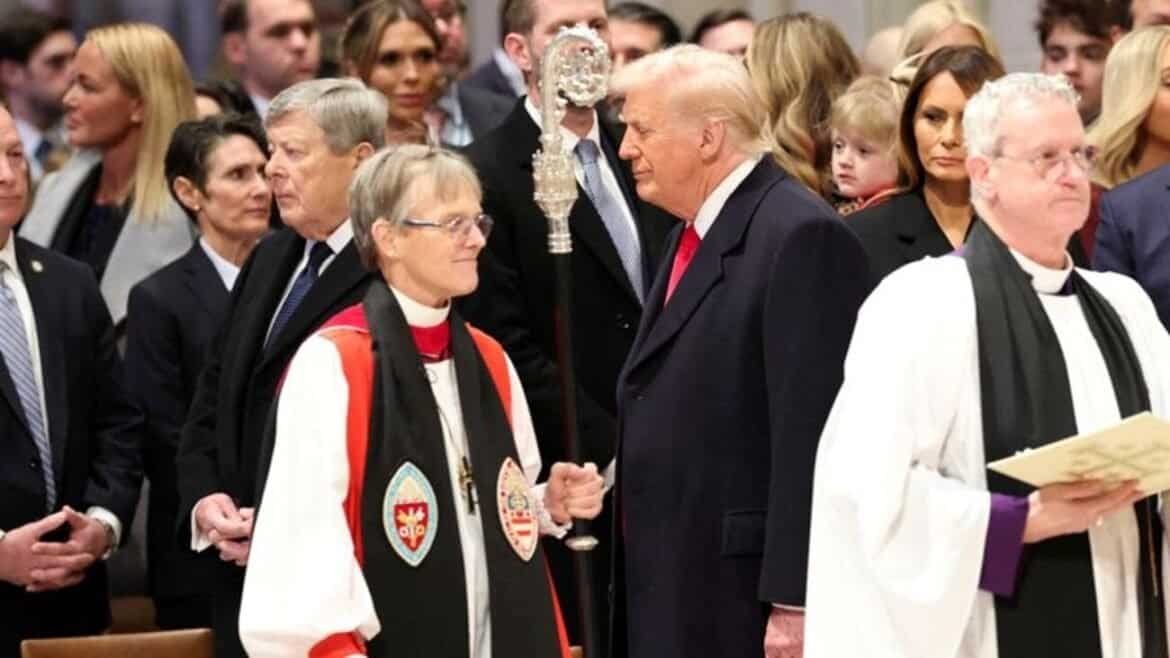The National Cathedral, a historic epicenter of prayer and reflection for the nation, witnessed a moment of bold and compassionate advocacy when the Right Rev. Mariann Edgar Budde, bishop of the Episcopal Diocese of Washington, directly addressed President Donald Trump during a prayer service. Her heartfelt plea for mercy on behalf of marginalized groups—LGBT individuals, undocumented immigrants, and those fleeing war and persecution—was both a spiritual call to action and a challenge to leadership.
As Christians, we often wrestle with balancing truth-telling and grace. Budde’s words, rooted in the teachings of Jesus, exemplified both. She invoked the ethos of the Sermon on the Mount (Matthew 5), urging compassion for “the least of these” (Matthew 25:40). Her sermon was a timely reminder that faith transcends political divides and calls believers to stand for justice, mercy, and love.
A Voice for the Vulnerable
Bishop Budde’s remarks were poignant, addressing fears and anxieties that ripple through communities often overlooked in political discourse. She highlighted the humanity of LGBT individuals, many of whom fear for their safety, and immigrants laboring tirelessly yet living in the shadows. Her call to “have mercy” resonated deeply with the biblical mandate to love the stranger (Deuteronomy 10:19) and seek justice for the oppressed (Isaiah 1:17).
This moment in the National Cathedral was not just a sermon; it was a prophetic witness. By addressing President Trump directly, Budde embodied the tradition of biblical prophets like Nathan confronting David (2 Samuel 12) or John the Baptist speaking truth to Herod (Matthew 14:3-4). She reminded us that Christian leaders are called to hold power accountable while extending a hand of reconciliation.
Balancing Compassion with Responsibility
Bishop Budde’s heartfelt plea for mercy also invites reflection on a critical tension in public discourse: the balance between compassion and the responsibilities of governance, particularly regarding national security and immigration policy.
Governments have a duty to protect their citizens, enforce laws, and maintain order. These responsibilities, however, must not come at the cost of dehumanizing others. Striking this balance is difficult, but it aligns with the biblical call to seek both justice and mercy (Micah 6:8). Leaders must navigate this tension thoughtfully, ensuring that policies are not only effective but also ethical and humane.
For instance, when addressing immigration, it is possible to uphold border security while treating immigrants and asylum seekers with dignity. Policies can and should reflect a balance between the need for safety and the moral imperative to care for those fleeing persecution and violence. As Budde pointed out, many immigrants contribute significantly to society by performing essential, often overlooked jobs. Recognizing their humanity and contributions does not negate the importance of secure borders; it enriches the conversation by adding compassion to the equation.
A Nation at a Crossroads
Budde’s sermon also highlighted a broader cultural crisis: the “culture of contempt” and the erosion of unity. Her words echoed Jesus’ call to love our enemies and pray for those who oppose us (Luke 6:27-28). In a world rife with division, her message was a plea to rebuild bridges, not walls, and to approach one another with humility and grace.
This call is especially urgent for the Church, which is uniquely positioned to model the reconciliation and mercy it preaches. Budde’s challenge to honor the dignity of every human being aligns with the core Christian belief that all are made in the image of God (Genesis 1:27).
A Call for Unity in Addressing Complex Issues
While Christians may disagree on the specifics of immigration or national security policies, they can agree on the principles of human dignity and justice. By fostering open, honest conversations that honor these principles, the Church can serve as a model for the broader society.
Ultimately, national interest and security must be approached with the same prayerful humility Budde called for in her sermon. Leaders and citizens alike must ask, “How do we protect and serve our nation while also honoring the biblical mandate to love our neighbor?” The answers may not be easy, but they are worth pursuing—because they reflect the heart of God’s kingdom.
Moving Forward in Faith
As the nation grapples with its divisions, Bishop Budde’s words serve as a clarion call to all who claim the name of Christ: to live out the gospel through acts of mercy, compassion, and advocacy. The Church must remain a voice for those who cannot speak for themselves and a beacon of hope in troubled times.
May we take to heart her prayer that God grants us “the strength and courage to honor the dignity of every human being, to speak the truth to one another in love, and to walk humbly with our God.” Let this be our guide as we navigate the challenges of our time, embodying Christ’s love in action.



